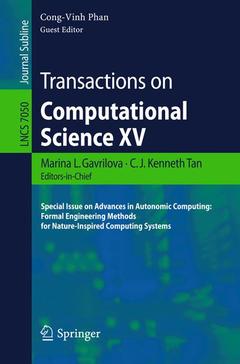Description
Transactions on Computational Science XV, 2012
Special Issue on Advances in Autonomic Computing: Formal Engineering Methods for Nature-Inspired Computing Systems
Transactions on Computational Science Series
Coordinator: Phan Cong-Vinh
Editors-in-Chief: Gavrilova Marina L., Tan C.J. Kenneth
Language: English
Subjects for Transactions on Computational Science XV:
Publication date: 03-2012
217 p. · 15.5x23.5 cm · Paperback
217 p. · 15.5x23.5 cm · Paperback
Description
/li>Contents
/li>Comment
/li>
The LNCS journal Transactions on Computational Science reflects recent developments in the field of Computational Science, conceiving the field not as a mere ancillary science but rather as an innovative approach supporting many other scientific disciplines. The journal focuses on original high-quality research in the realm of computational science in parallel and distributed environments, encompassing the facilitating theoretical foundations and the applications of large-scale computations and massive data processing. It addresses researchers and practitioners in areas ranging from aerospace to biochemistry, from electronics to geosciences, from mathematics to software architecture, presenting verifiable computational methods, findings, and solutions and enabling industrial users to apply techniques of leading-edge, large-scale, high performance computational methods. The 15th issue of the Transactions on Computational Science journal, edited by Cong-Vinh Phan, contains six invited papers on autonomic computing, with a special focus on formal engineering methods for nature-inspired computing systems. The papers give an in-depth overview of the area and a comprehensive evaluation of various methodologies for autonomic computing.
Formal Methods for Modeling, Refining and Verifying Autonomic Components of Computer Networks.- Self Organization for Area Coverage Maximization and Energy Conservation in Mobile Ad Hoc Networks.- Data Intensive Distributed Computing in Data Aware Self-organizing Networks.- Accelerated Evolution: A Biologically-Inspired Approach for Augmenting Self-star Properties in Wireless Sensor Networks.- Developing Autonomic Properties for Distributed Pattern-Recognition Systems with ASSL: A Distributed MARF Case Study.- Autonomic Nature-Inspired Eco-systems.- A Logical Approach to Data-Aware Automated Sequence Generation.
Focuses on recent advances in autonomic computing Addresses various problems related to formal engineering methods for nature-inspired computing systems Of interest to computer scientists and computer engineers, including developers and practitioners in computing and networking systems design
© 2024 LAVOISIER S.A.S.




